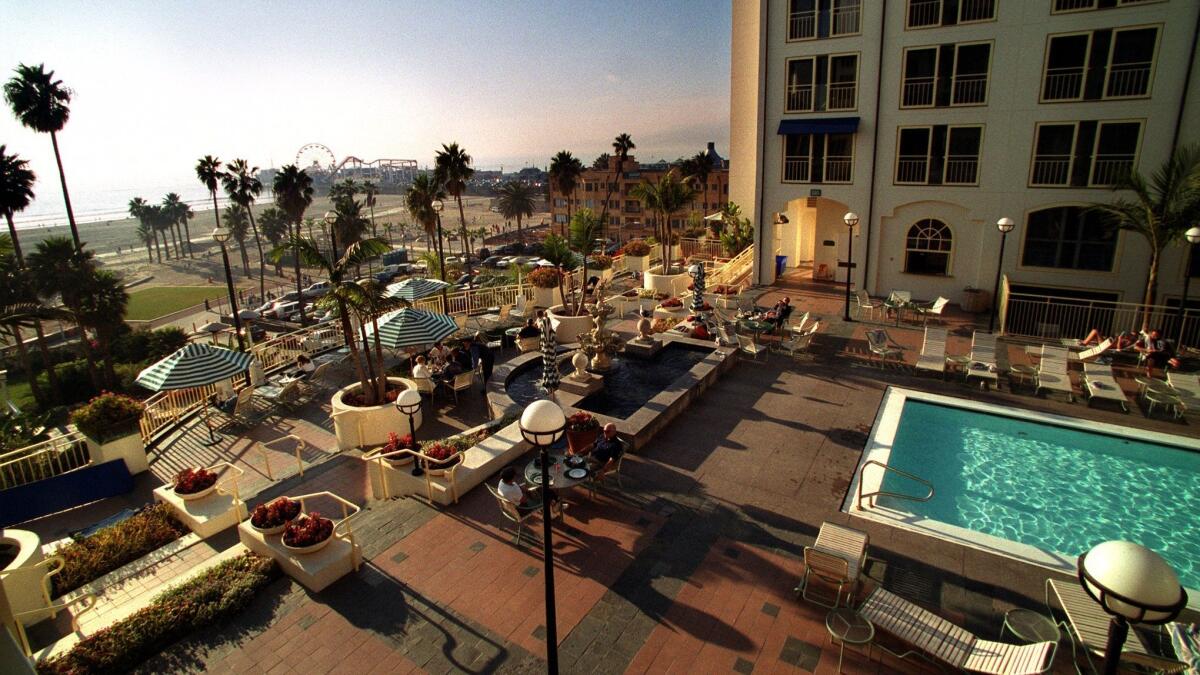Santa Monica wants to know who owns its popular beachfront hotels

- Share via
The Waldorf Astoria New York, once a renowned symbol of luxury on Park Avenue, is being converted to luxury condominiums under its new owners, Chinese insurance giant Anbang Insurance Group.
Labor union leaders and city officials in Santa Monica are now worried that the same fate could befall the Loews Santa Monica Beach Hotel, a beachfront property purchased last year by the same Chinese firm.
In a unanimous vote, the Santa Monica City Council instructed its lawyers early Wednesday morning to draft legislation that would force hotels in the city to disclose their ownership and look into ways to keep hotels from being converted to other uses.
The purpose is to protect hotel jobs and tax revenue from the beachfront community’s booming hospitality industry.
“This is local and immediate,” said Councilman Kevin McKeown, who proposed the motion with the support of Unite Here local 11, which represents 1,200 hotel workers in Santa Monica, including 250 at the Loews hotel.
The purchase of the Loews reflects a trend among Chinese businesses and wealthy investors who have been trying to diversify their portfolios by investing abroad in a variety of industries, including real estate and entertainment. Industry experts say the U.S. hospitality industry, with its vast real estate holdings, is seen as a stable investment.
Beijing-based Anbang is a prime example of this trend, by purchasing luxury U.S. hotel properties, including its acquisition last year of the Waldorf Astoria for $1.95 billion from Hilton Worldwide Holdings.
Anbang, which is reported to have strong political ties to China’s leadership, also was part of the consortium that tried to buy Starwood Hotels and Resorts Worldwide but dropped out after a bidding war with Marriott International.
Anbang moved last year on a $6.5-billion deal to purchase 15 luxury properties, including Loews Santa Monica and other hotels that were part of Strategic Hotels and Resorts.
Santa Monica city officials and hotel union workers said the trend of foreign ownership worries them because it is difficult to identify the individuals who control the entities and what they intend to do with the properties they acquire.
The concern was heightened when Anbang began a three-year construction project in New York to convert the Waldorf Astoria to about 400 luxury condos.
Then, two weeks ago, Anbang announced that its chairman, Wu Xiaohui, was stepping aside temporarily for “personal reasons” and that he had authorized “relevant senior executives to continue running the business.”
The announcement came hours after news reports that Wu had been taken by Chinese authorities from the Anbang offices.
“Anbang is a local example of the murky ownership and the sources of capital,” Danielle Wilson, a representative of Unite Here, told the council during the meeting, which stretched past midnight Tuesday.
A representative for Strategic Hotels and Resorts could not be reached for comment.
During the meeting, Farid Chevez, who identified himself as a dishwasher at the Loews hotel, said he was worried about the future of the hotel and his job under new ownership.
“We don’t know what is going to happen with the owner,” he said.
Consultant Alan Reay of Atlas Hospitality Group said converting the hotel into condominiums would make financial sense but overcoming the regulatory barriers and local opposition would be very difficult.
“I just don’t see it going through,” he said.
To read more about the travel and tourism industries, follow @hugomartin on Twitter.
More to Read
Inside the business of entertainment
The Wide Shot brings you news, analysis and insights on everything from streaming wars to production — and what it all means for the future.
You may occasionally receive promotional content from the Los Angeles Times.











